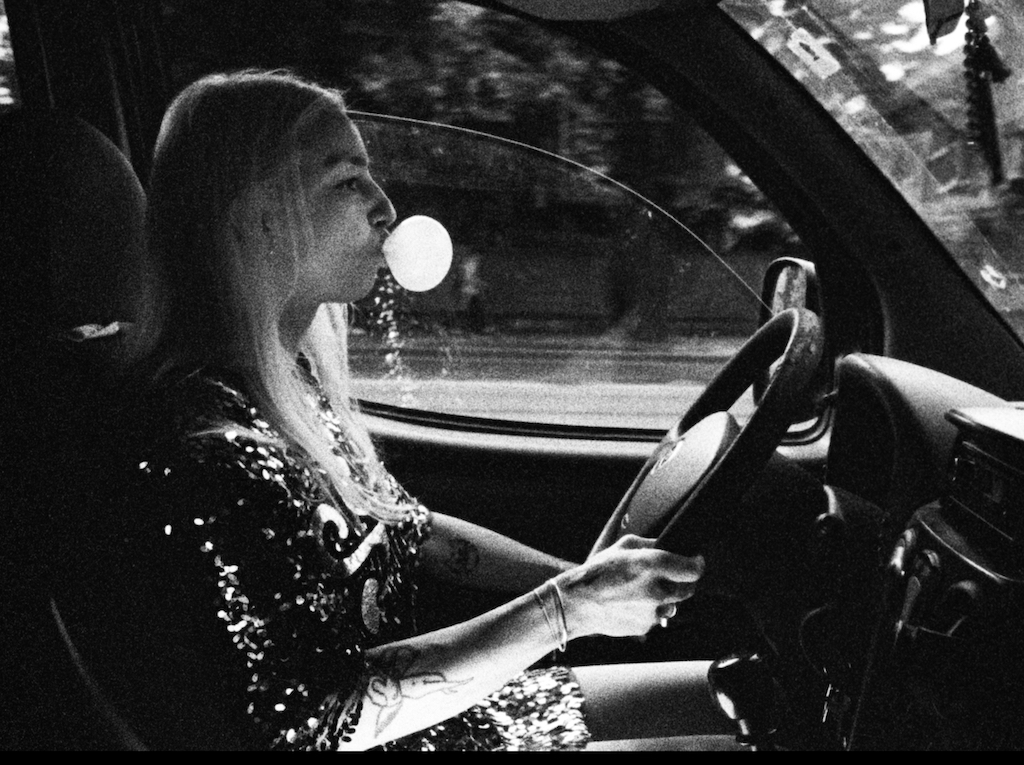Filmmaker Radu Jude’s Do Not Expect Too Much From the End of the World follows a production assistant on a long day’s drive to screen injured Romanian workers for a workplace safety video — painting a bleak, darkly funny portrait of a hollowed-out world.
**D |**o Not Expect Too Much From the End of the World, the latest film by Romanian writer and director Radu Jude, opens with a phone alarm going off at the ungodly hour of 5:50 a.m. As the overworked, underpaid film production assistant (PA) at the center of the story reaches out to silence the alarm, we see her nightstand, littered with the detritus of a hazy night in: an overturned beer bottle, a mostly empty glass of wine, and Marcel Proust’s In the Shadow of Young Girls in Flower. Call it greeting the day with a grimace.
Throwing on a sequined dress, Angela Răducanu (Ilinca Manolache) stumbles to her van to start an unending day of driving around Bucharest. As is so often the case in the industry, the hours of driving will go on interminably, stretching well into the night. Jude himself was once a PA, and he has said that the death of a fellow PA in a car crash — a stunningly frequent occurrence in the industry — was part of the film’s inspiration.
Angela’s route is determined by a local production company that has been tasked with making a workplace safety film for an Austrian conglomerate that is seeking to polish its reputation and reduce its liability. The conglomerate wants to have a worker who was injured in its Romanian factory appear in the video, and Angela’s task is to prescreen the many candidates. She goes from one shabby apartment to another, filming the borderline-destitute disabled workers as they audition, hoping for the 500 euros that come with the role. Their desperation is palpable, the anxiety radiating off the thin walls. Some of the workers’ families plead with Angela to put in a good word, but the decision is up to the Austrians; after all, she’s just another worker being exploited by the wage differential between her country and that of the corporate overlords.
In crowded homes, workers recount their misfortunes for the screen. One fell off a platform in the factory, but because she had taken a sip of alcohol handed to her in celebration of a coworker’s birthday, the corporation claims it was her fault. Ditto for a worker with a disturbing facial scar who lost the ability to speak following his accident; Angela breaks the news that the corporation is unlikely to choose someone who is mute. Then there is Ovidiu (Ovidiu Pîrșan), the worker who the Austrians ultimately choose, a family man who was hit in the head with a rusty piece of metal being used as a barricade in the company parking lot: the impact put him in a coma, then paralyzed him from the waist down.
This is not a safety video; it’s pure propaganda. The conglomerate clearly shares some of the blame for the injuries, yet the most important part of the script, as Angela tells one worker, is when they implore employees to wear the company’s protective gear and not take irresponsible risks, as if it were their own mistakes that left them injured.
About half an hour into Jude’s film, it occurred to me that I was in for a nearly three-hour car ride with Angela. Claustrophobia threatened as I watched her listen to pounding club music and heavy metal, sucking down energy drinks to try to keep from falling asleep at the wheel. (“I can’t go on like this,” she tells a doorman at one point, to which he responds, “That’s what you think.”) That her driving is only ever interrupted by phone calls, usually from her employer, which her phone announces with the “Ode to Joy” (the European Union’s official anthem), only made the atmosphere ghastlier. Much like Jude’s 2021 Berlinale-winning Bad Luck Banging or Loony Porn, Do Not Expect Much From the End of the World has some trying moments. Spending all day stuck in traffic does suck.
Thankfully, Angela’s deliriously scattered dialogue pulled me back down another rabbit hole before my dread could take hold. She’s a magpie, as familiar with Karl Marx and Jean-Luc Godard as she is with celebrity gossip and raunchy jokes (one story she tells, about a porn star who had to pull up PornHub on his phone mid-scene to stay hard, is especially memorable). The jumble of referents evokes social media: specifically TikTok, with its jump cuts and chaotic juxtapositions. And as it turns out, Angela is big on TikTok.
Or rather, her alter ego, Bobiţă — an Andrew Tate–like figure who tells ludicrously pornographic, deeply offensive anecdotes — is big on TikTok. Angela uses a filter to become Bobiţă, though she betrays no concern that her blond hair and body are often visible in frame, overrunning the bounds of the unsettling filter (at the press screening I attended, we received cutouts of Bobiţă’s face; when I texted a photo of the bald, bushy-browed visage to a friend, he informed me that he had immediately deleted the picture).
read more: https://jacobin.com/2024/04/radu-jude-romania-film-review/
Cannot overemphasize how funny this film is. Like laugh out loud hilarity combined with the intense bleakness of late capitalism. Superb movie.



